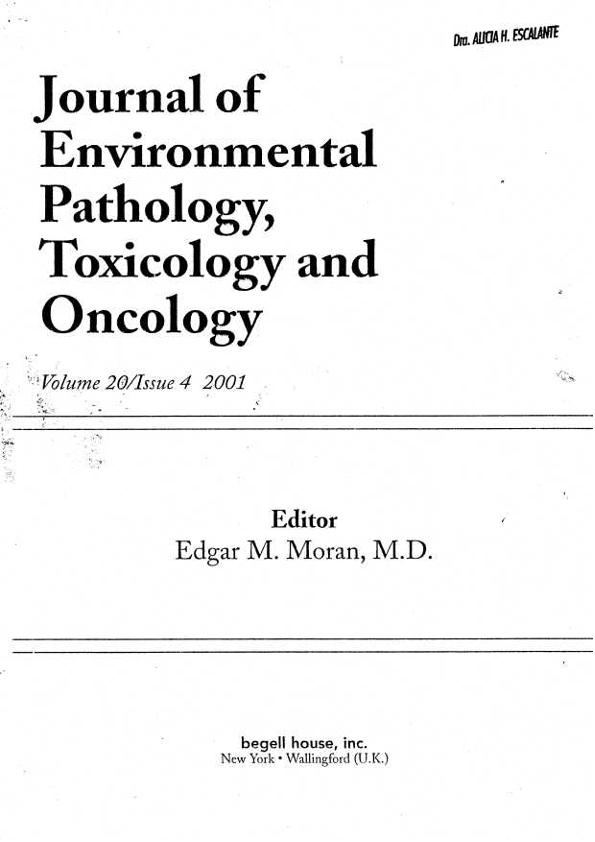Mostrar el registro sencillo del ítem
dc.contributor.author
Campana, Marcela A.
dc.contributor.author
Panzeri, Ana María

dc.contributor.author
Escalante, Alicia Haydee

dc.contributor.author
Moreno, Victor Jorge

dc.contributor.author
Dulout, Fernando Noel

dc.date.available
2019-02-04T14:56:23Z
dc.date.issued
2001-11
dc.identifier.citation
Campana, Marcela A.; Panzeri, Ana María; Escalante, Alicia Haydee; Moreno, Victor Jorge; Dulout, Fernando Noel; Micronucleus test in fish from a pampasic pond (Argentina): an estimation of the presence of genotoxic compounds; Begell House; Journal of Environmental Pathology, Toxicology and Oncology; 20; 4; 11-2001; 325-331
dc.identifier.issn
0731-8898
dc.identifier.uri
http://hdl.handle.net/11336/69263
dc.description.abstract
The Los Padres pond is one of the commonly shallow, polymictic lakes from the so-called depressed Pampa (Argentina). Its watershed includes one affluent, named Los Padres creek, which flows through horticultural lands wherein great amounts of pesticides are applied. Opposite to this stream, the pond drains into La Tapera creek that is the effluent running toward the sea. Many studies have confirmed the capacity of various pesticides to induce genetic damage. The use of micronucleus (MN) tests in fish has enabled us to detect the presence of contaminants in the lake water and to evaluate their genotoxic effects. For this purpose, water samples were collected during April, August, and December 1999 from both creeks characterized by different environmental conditions. In the laboratory, specimens of tetras Cheirodon interruptus (Pisces, Characidae) were reared in water samples from the two creeks. Control fish were kept in drinking water. Fifteen individuals from each experimental group were sacrificed after 24-, 48-, and 72-hour exposure intervals. Micronucleus frequency in fish erythrocytes was determined, and the Kruskal–Wallis test for statistic analysis was used. We made the following observations: (1) Highly significant differences occurred in MN frequency between the control group and the samples from both creeks. (2) An increase in MN frequency was evident in specimens sampled from the affluent input during the month of December. These results allowed us to conclude that the increase in MN frequency observed in fish belonging to both sampling sites would indicate the existence of genotoxic compounds in the Los Padres pond. The high MN frequency in fish collected near Los Padres creek inlet might be related to the polluted load transported by the affluent and discharged into the lake’s surface waters. Future work would allow us to develop efficient methods for predicting the presence of genotoxic contaminants. It would be possible then to propose strategies for regulating and decreasing the sources of pollution that affect human health.
dc.format
application/pdf
dc.language.iso
eng
dc.publisher
Begell House

dc.rights
info:eu-repo/semantics/openAccess
dc.rights.uri
https://creativecommons.org/licenses/by-nc-sa/2.5/ar/
dc.subject
Micronucleus
dc.subject
Fish
dc.subject
Genotoxic
dc.subject.classification
Otras Ciencias Biológicas

dc.subject.classification
Ciencias Biológicas

dc.subject.classification
CIENCIAS NATURALES Y EXACTAS

dc.title
Micronucleus test in fish from a pampasic pond (Argentina): an estimation of the presence of genotoxic compounds
dc.type
info:eu-repo/semantics/article
dc.type
info:ar-repo/semantics/artículo
dc.type
info:eu-repo/semantics/publishedVersion
dc.date.updated
2019-01-14T16:29:43Z
dc.identifier.eissn
2162-6537
dc.journal.volume
20
dc.journal.number
4
dc.journal.pagination
325-331
dc.journal.pais
Estados Unidos

dc.description.fil
Fil: Campana, Marcela A.. Universidad Nacional de Mar del Plata. Facultad de Ciencias Exactas y Naturales. Departamento de Biología; Argentina
dc.description.fil
Fil: Panzeri, Ana María. Universidad Nacional de Mar del Plata. Facultad de Ciencias Exactas y Naturales. Departamento de Biología; Argentina
dc.description.fil
Fil: Escalante, Alicia Haydee. Consejo Nacional de Investigaciones Científicas y Técnicas. Centro Científico Tecnológico Conicet - Mar del Plata. Instituto de Investigaciones Marinas y Costeras. Universidad Nacional de Mar del Plata. Facultad de Ciencias Exactas y Naturales. Instituto de Investigaciones Marinas y Costeras; Argentina
dc.description.fil
Fil: Moreno, Victor Jorge. Universidad Nacional de Mar del Plata. Facultad de Ciencias Exactas y Naturales; Argentina
dc.description.fil
Fil: Dulout, Fernando Noel. Universidad Nacional de La Plata. Facultad de Ciencias Veterinarias; Argentina. Consejo Nacional de Investigaciones Científicas y Técnicas; Argentina
dc.journal.title
Journal of Environmental Pathology, Toxicology and Oncology

dc.relation.alternativeid
info:eu-repo/semantics/altIdentifier/url/http://www.dl.begellhouse.com/journals/0ff459a57a4c08d0,2702b9a25a52a498,345b0adb164f5189.html
dc.relation.alternativeid
info:eu-repo/semantics/altIdentifier/doi/http://dx.doi.org/10.1615/JEnvironPatholToxicolOncol.v20.i4.90
Archivos asociados
